The educational field is under significant pressure, due to the profound transformations driven by technological advancements, evolving societal needs, and global challenges. Economic upheavals, international conflicts, increasing polarisation, declining faith, large-scale migrations, and the challenges posed by ageing populations all demand for a rethinking of educational systems. Nonetheless, the challenges that lie ahead may prove even more complex than we expect. Climate-related crises, the accelerated digitalisation of economies and societies, and emerging forms of domestic and international political instability are likely to shape a future that drastically differs from current expectations. The future of global education stands at a critical juncture. In the face of looming global challenges, it is nowadays essential to redesign education, in order to foster shared, interdependent futures (UNESCO, 2021). Scientific communities and governments must engage in long-term, strategic thinking to develop a new educational paradigm that addresses these challenges and seizes emerging opportunities. How can global education evolve, to equip individuals with the skills, knowledge, and attitudes necessary to thrive in an unpredictable world? How can we design learning environments that nurture these same qualities in our children? How educational organisations could foster psychological resilience in students, helping them cope with the uncertainties of a rapidly changing world? A rich body of pedagogical theories and practices has been produced and has shaped a culture of childhood centred on "student’s centrality," on pedagogical relationships and learning settings tailored to the needs of students. Building upon this solid foundation, it is now time to envision a new paradigm, that reimagines schools as ecosystems—shifting from rigid structures to systems that are open, adaptive, capable of taking into account subjectivity, and thus inclusive. In this ecosystem, everyone grows together, embracing change and building a world where education is truly a lifelong, transformative experience. Scientific research exploring learning & cognition, both from neuroscientific (Kandel et al., 2000) and neuro-phenomenological (Varela, 1996; Thompson, 1997) perspectives, place the mind-body-environment connection at the heart of scientific inquiry. This same theme/connection is central to the reflection in the field of enactive teaching (Rossi, 2011) and Neurodidactics (Rivoltella, 2012). A new vision is emerging that draws on the metaphor of education as a living ecosystem, where all elements are interdependent, constantly interacting, and evolving. In this context, education becomes an adaptive network that responds to societal, environmental, and technological changes. Such ecosystems are inherently sustainable and future-ready, fostering resilience, adaptability, and collaboration. In light of these shifts, is it still useful to maintain a clear distinction between the roles of teacher, student, and other learning concepts such as teaching, gaming, environment, technology, and the body? Education can transcend the physical and conceptual limits of a classroom/row of desks and static curricula, thriving within adaptive ecosystems enriched with sensory stimuli, fostering curiosity, creativity, and engagement. Such environments align with the constructivist theories of Jean Piaget and Lev Vygotsky, which emphasize that knowledge is constructed through the interaction with the world and social collaboration. In these settings, interconnected elements—students, teachers, technology, and physical surroundings—interact to foster growth and adaptability. The Universal Design for Learning model fosters the concept of adaptivity and represents an approach that no longer prioritizes the individual learner over the act of learning. Instead, it views the transaction between learning environments, resources (both digital and physical), learners, and teachers as a generative learning situation (Oppl et al., 2017). In this framework, the role of teachers is transformed. Teachers needs to shift toward a flexible mindset and engage as co-learners, adapting to the stimuli and dynamics of the learning process, in physical and virtual environments (Limone, 2021). Both teachers and students participate in a mutual exchange, adapting to the stimuli and experiences that naturally emerge during learning. Education thus becomes a dynamic journey, driven by curiosity and collaboration, rather than a linear progression following predefined contents. Thanks to neuroscientific findings, we know the impact of educational systems and environments on brain development, neuroplasticity, and personalised learning. Research in cognitive science suggests that learning is most effective when tailored to individual needs, experiences, and neural pathways. Early sensory experiences, for instance, can shape the brain’s architecture to foster cognitive growth (Kuhl & Ramirez, 2019), and enhance creativity and problem-solving abilities (Hardiman, 2019), while also reducing stress (Caine & Caine, 1990). Psychological research further underscores the the role of individual sensemaking in how teachers engage with and students internalize learning experiences. A post-constructionist approach to teaching (Roth et al., 2014) emphasizes the inseparability of theory and practice, and the fusion of the learner with the learning ecosystem in which the educational experience unfolds (Rivoltella, 2021). In this paradigm, physical and virtual environments interact in a personalised and flexible way, providing an integrated learning experience for both students and teachers (Fissore & Marchisio, 2020). REN Conference aims to offer the space and opportunities to explore these shifts and envision the future of learning. The event will bring together educators, researchers, policymakers, and innovators to share insights, propose solutions, and foster collaboration in shaping the education systems of tomorrow. Join us in shaping the future of education and contributing to a meaningful dialogue on this transformative journey. Together, we can build an educational scenario/landscape that is adaptive, inclusive and prepared for the challenges of tomorrow.
CO-ORGANIZZATORI


PATROCINIO



